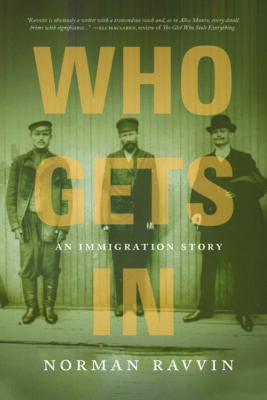Norman Ravvin is a scholar with a patient eye and flowing prose. The award-winning author and professor of Jewish Studies at Concordia University recently dug into his own family history to better understand how his late grandfather, a Jewish immigrant born in rural Poland, managed to relocate his family to Western Canada in the early 1930s. Who Gets In: An Immigration Story represents the outcome of this research project. The book details the Kafkaesque bureaucracy and xenophobic immigration policies that Yehuda Yosef Eisenstein, Ravvin’s grandfather, fought tooth and nail in his early years in Canada.
Who Gets In blends biography and memoir, highlighting the growth of Canadian antisemitism and Eisenstein’s relentless battle against it. While his grandfather often finds support in different corners of Canada’s Jewish community, his own tireless efforts are what drive the story forward. He first travelled to Canada in 1930, leaving his wife and two children behind in Poland and falsely claiming to be unmarried on immigration documents. He then spent the next five years petitioning Canadian immigration and citizenship officials to grant his wife and children the right to legally embark on the same transatlantic voyage.
Who Gets In University of Regina Press
An Immigration Story
Norman Ravvin
$29.95
paper
320pp
9780889779228
Who Gets In also tells a larger history of Canada’s racist immigration policies. In an early description of the book project, Ravvin described his grandfather as a “prismatic figure” through whom he would analyze Canada in the 1930s. The results stretch farther and wider than his intentions: Ravvin gives a thorough background on the Indigenous communities who were pushed out of Southern Saskatchewan, where Eisenstein would later settle, while also uncovering nuances of the 1914 Komagata Maru incident. He even shows how the struggle against xenophobic immigration policies extends to the present day, for example with Quebec’s Bill 21.
While Ravvin’s grandfather faced incredible challenges bringing his family to Canada, Who Gets In is a story of struggle, not one of loss. Taking place while Hitler rose to power in Germany, Eisenstein’s immigration story sheds a light on a chapter of Canadian history that one might wish to forget. From the 1910s until the end of World War II, Canadian immigration became more and more restrictive. By highlighting this ugly truth, Ravvin shows that the rhetoric of multiculturalism in Canada is a more recent about-face. He uncovers the roots of systemic and institutionalized racism in Canada and spotlights the wreckage of Canada’s nation-building ambitions. At the same time, he shows the power of human will to chip away at this prejudice, against all odds.mRb






0 Comments